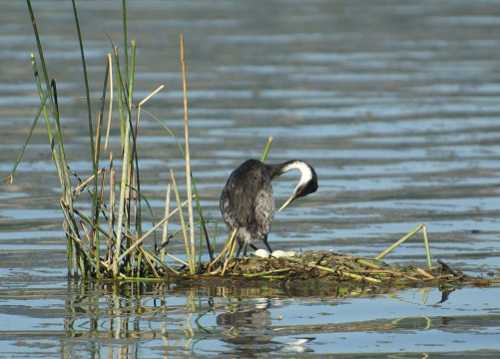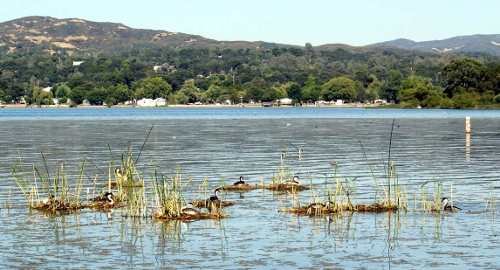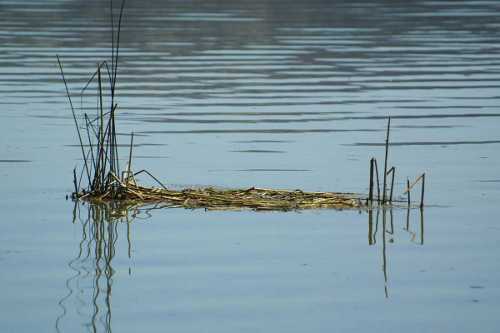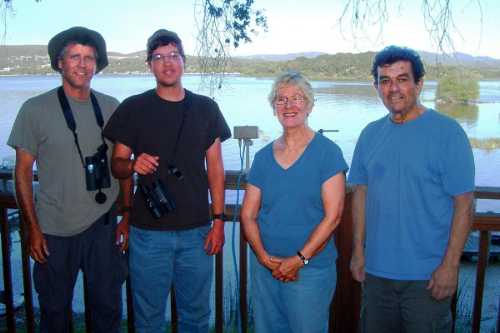
LAKE COUNTY, Calif. – The story that follows is about an unexpected adventure creating a live-action film whose stars departed while the film was in production.
The stars are Western and Clark’s Grebes, birds that breed on Clear Lake in the summer and sometimes stay here year-round.
Lake County residents love watching their courtship displays of “rushing” across the water in synchronized pairs.
Grebes form large colonies of floating nests made from tule reeds, and babies ride on the parent’s back for their first six weeks of life.

Usually the only people who get to see these very unusual bird behaviors are boaters, fishermen, people living along the lakeshore, or attendees who take the annual Heron Festival boat tours conducted by our local Redbud Audubon chapter.
During the past two weeks Redbud Audubon tried to make these sights available to anyone with Internet access, using a Webcam, which is a video camera linked to a computer and then to the Internet. Viewers anywhere in the world could then watch live action of nesting grebes at a grebe colony.
The chapter undertook this experimental Webcam as part of a public outreach grant to educate the public about the need to protect vulnerable nesting colonies during the grebe breeding cycle.
This Audubon project is in the second year of a four-year grant. Two other Audubon chapters are doing similar outreach campaigns protecting grebes on nearby lakes. Audubon California obtained the grant from the Luckenbach Trust Council.
The grebe colonies on Clear Lake are usually either in open water or secluded coves without nearby homes.

On Aug. 3 Audubon was contacted by John Deiderich about a colony of about 100 nests that happened to be close enough to a row of waterfront homes that a Webcam could view the nest areas. There had not been a colony in this location for at least 20 years.
Audubon staff approached the homeowner nearest to the nest area, and Rich Marquez agreed to allow the camera to be set up out on his second-story deck.
Audubon learned that this colony had already been nesting for three weeks, which meant that chicks could arrive within days (grebe eggs incubate 28 days). After all the chicks hatch, the grebes desert the nests and move out into the lake to feed. Thus it was urgent to get the Webcam up fast.
Over the next six days, Redbud researched and acquired the needed equipment. Invaluable guidance came from Pete DeSimone, manager of the Starr Ranch Audubon Sanctuary in Orange County. DeSimone has set up three nest-cams linked to the sanctuary’s Website – a barn owl nest, hummingbird nest, and black phoebe nest.
DeSimone loaned Redbud a camera, explained exactly what cables and software Redbud needed to buy, advised on uploading the video data with a wireless Internet card and put us in touch with a firm in Arcata that provides an interface between the uploaded data-stream and our Redbud Audubon Web site.

The streaming firm provides multiple servers so that up to 50 viewers can watch the video simultaneously without crashing the Web site.
Amazingly, the Web cam went live on Aug. 11, eight days from the starting point.
For the first few days, the camera focused on seven nests, and viewers were able to watch grebe parents taking turns sitting on the eggs, bringing food and adding to the nests with more tules nesting material.
Then beginning early last week, Audubon started seeing changes at the Webcam nests.
Originally there were seven nests with eggs and sitting grebes on them. Over several days, the grebes began deserting the nests, leaving the eggs unprotected.
On the afternoon of Wednesday, Aug. 17, a new pair of grebes appeared, rebuilt a deserted empty nest, deposited new eggs and began sitting on them.
When the camera was turned on Thursday morning, both the nesting grebe and the eggs were gone.
A possible explanation is that an otter family had been seen swimming in the area on Tuesday, so perhaps after the camera was turned off Wednesday night, the grebe parent deserted the eggs, and the otters found and ate the eggs.
Audubon birders have seen otters attack grebe nests in the past, so this may be a probable cause for the eggs’ disappearance.
But why did the parents desert the eggs before hatching? That question applies not just to the nests being filmed, but throughout the Clear Lake colonies this past week.
On Monday, Aug. 15, Dr. Floyd Hayes discovered that a colony of over 100 nests at Long Tule Point that he monitored last Thursday was now completely deserted. The nests were now pushed together very close to shore, most likely blown there by the winds on the lake this weekend.
Surprisingly, the nests themselves were mostly intact, many with eggs still in them, but no grebes were incubating. The eggs had been deserted by the parent grebes.

The grebe project team’s sadness and disappointment at this loss was profound. Puzzlement over the cause of this behavior led to a number of email discussions involving Terry Knight and Floyd Hayes.
The most probable explanation is that food sources for the imminent babies was insufficient to sustain them. Somehow, nature senses when this problem occurs, and the birds then do not complete the breeding cycle.
However, there may be good news to come.
Terry Knight reported that silverside minnows – a favorite food for grebes – and baby bass are becoming plentiful in the lake, and Audubon has seen a new grebe colony forming at the north end of the lake.
It is possible that the grebes will start another breeding cycle that can be completed before migration begins. Last year Audubon saw nesting up into early October, so perhaps all is not lost this year.
But for the moment at least, the Webcam is turned off because there is no activity at that colony area.
Redbud Audubon is greatly disappointed because the project team was so excited about being able to share video of newborn chicks being carried on a parent’s back while the other parent brought food to the babies.
For now, that is not going to happen. But Redbud Audubon has learned a lot from this experiment, and will try again if nesting returns to the area where the camera was located.
And, even though this Webcam had a short life, this was the first time anywhere that a nesting bird Webcam focused on grebes.
Marilyn Waits is president of the Redbud Audubon Society.
Follow Lake County News on Twitter at http://twitter.com/LakeCoNews, on Tumblr at www.lakeconews.tumblr.com, on Facebook at http://www.facebook.com/pages/Lake-County-News/143156775604?ref=mf and on YouTube at http://www.youtube.com/user/LakeCoNews.

 How to resolve AdBlock issue?
How to resolve AdBlock issue? 





